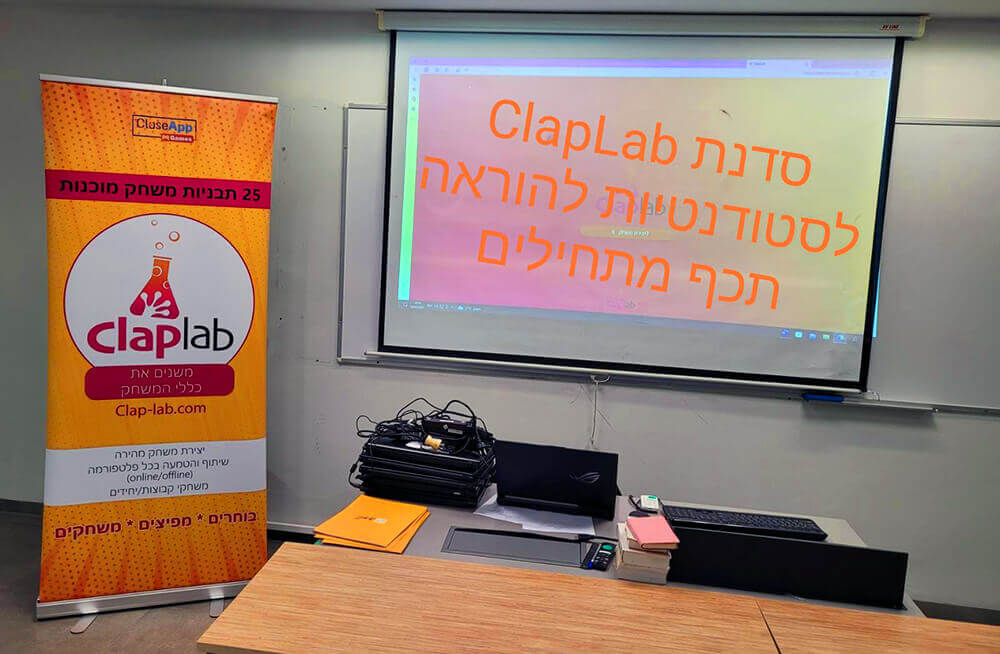How to write successful questions, this is one of the questions we get asked most often!
Since we released the game generator ClapLab, which allows anyone to create a game using their own content,
We are asked by content creators and by many users:
How to compose a suitable question or challenge that will also bring pleasure to the players in the game?

A challenge to the game creators!
In the various workshops we give to teaching students and teachers, it turns out that this is the biggest challenge for content creators ( we remind you that we are happy in the grapevine ).
The matter is complex yet simple. Game producers know the material, but for content to be interesting it needs to be challenging and still allow players to enjoy it.
For this reason many simply give up on creating games independently and prefer to look for games that others have created, even if the content is inaccurate and does not fit what they want to convey.
Therefore, we decided to write the guide in front of you, which explains how to compose and write correct questions.
The questions can be good for quizzes, generator games and even tests and worksheets.
The most important rule in composing questions is:
Ask questions that respect the questioners and the respondents .
Principles and tips for writing good questions!
First principle: surprise
Any interviewer will tell you that a good question is one that catches the interviewee off guard.
This principle is also true when writing a question for the game.
The guideline is how to ask the question in a slightly different way, which will surprise whoever sees the question.
For example, instead of asking: “How many days is Hanukkah?” (formulation A)
One can ask: “What is the holiday in which the number of days is the most?” (wording B)
The players will answer the question in wording A very easily, and won’t even have to think. The question in wording B will surprise whoever sees it, so then the thinking about the answer will be different.
In such a case, we will see a smile on the faces of the respondents of formulation B because they are being challenged. Their brain will process the question better and when they answer the answer they will be very focused.
On top of that, in wording B, the answer encompasses much more material without the respondents feeling that we have disrespected them.
Second principle: smart wording
Smart phrasing makes it possible to ask the question in a different way, so that it will also connect the contestants more to the question, and of course to the answer, and activate their thinking in a different way.
For example, instead of asking: “In what season does it rain?”
Asked: “If I went outside and got wet from the rain, it is likely that we are in the season of…?”
The wording here did not change the essence of the question, but made it much more interesting, and such that those who answer it feel more challenged and feel that the question respects them more and is not “stupid”.
Third principle: graded challenge
An important rule in games, and certainly in asking questions, is to always ask one level above the place where the person answering the question is.
If we ask a question that is too difficult, it will create a feeling that there is no point and no reason to try because it is not at their level.
If the question is too easy, they will again feel that the question is not at their level and maybe even a bit condescending.
Therefore, one has to gently find the right distance between the current knowledge and the wider one, and of course, each time add a little more.
It is difficult to give an example of a graded challenge because the material varies a lot, but we will give a small example from a calculator for small children:
Instead of asking 1+1 = 2, can I ask 1+? = 2.
In essence, we asked a question with a vanishing point, which very young children could not answer, even though it is not particularly difficult. But children who understand the trick will feel very smart and respond to the challenge.
The great advantage of the challenge is that those who watch feel very smart and experience progress in their knowledge and level, so they will also want to continue playing and being a part.
Fourth principle: stories
You can make any question challenging as soon as you turn it into a story, because we all connect to stories and love stories.
When asking a question using the story, the players connect with the character (even in one sentence) and are distracted from the content. Because of this their answer is more emotional and connected and so is the question interesting!
For example, instead of asking: What is the number of the road that connects Jerusalem to Tel Aviv?
You can ask: an Israeli family went on a trip to the capital city of Jerusalem, when they left their home in Tel Aviv it was a sunny spring day and no clouds. However, in the middle of the road, the sky darkened and torrential rain washed the road. And if that wasn’t enough, strange noises were heard from the hood and the father of the family had to stop on the side of the road.
When they called the rescue center, the operator asked them to explain which road they were on.
Help the father of the family and tell him which road the family got stuck on.
Although the question is longer, and of course cumbersome, but during the story the players identify and connect and when they answer (and certainly when they help a family in need) they feel good. So for sure the question is not boring.
Fifth principle and summary: not to question the obvious
A principle that connects all questions to the world is not to ask the obvious. If you have written a question and it is self-explanatory, try to think how to phrase it differently, how to find another angle to the same question, how to tell the question. I’m sure you’ll find interesting ways to phrase the question better.
One of the most recommended challenges is to try to change the question word. Instead of asking a question with the obvious word, randomly choose another question word and try to match the question to it.
It just works!
For example, instead of asking: What did Alexander Graham Bell invent?
You can choose a different question word, and ask the question for example:
When will we remember Alexander Graham Bell’s invention?
The question is no longer self-evident and an easy question becomes more challenging and activates the respondents a little more.

Challenge, challenge, challenge
As we started, it is most important to challenge and respect those who play our games, not to fear more difficult questions that will move them to another level, and on the other hand not to make it too difficult.
Always think of the fun the players will have along with the compliment they will get when they answer a good question asked.
If you have good questions about our guide to writing questions, feel free to send them to us through contact .

The article was written by Ami Hania – a content expert and ClapLab entrepreneur who has been writing questions and content for over 20 years.
And for the last five years he has been producing the Shabbat game where every week there are questions and new content for the games.










